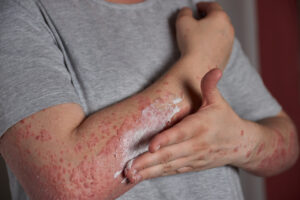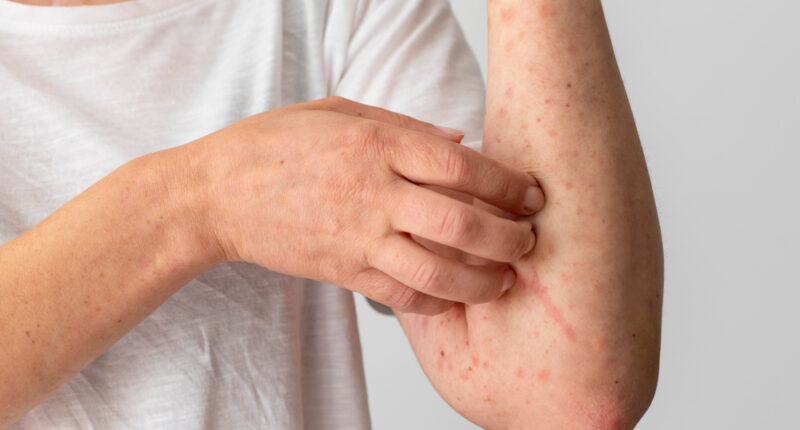Eczema, also known as atopic dermatitis, is a persistent skin issue that leads to dry, itchy, and inflamed skin. While medical treatments are essential, many people find relief through home remedies that can soothe and manage eczema symptoms. This blog explores 15 effective home remedies for eczema to help you achieve healthier, more comfortable skin.
1. Coconut Oil
Did you know that coconut oil is not only a fantastic natural moisturizer, but it also has anti-inflammatory properties? Amazing, right? Apply virgin coconut oil to affected areas to help reduce dryness and itching. It’s especially effective after bathing when the skin is still damp.
2. Oatmeal Baths
Oatmeal possesses calming and anti-inflammatory characteristics that can alleviate itchiness and discomfort. Add colloidal oatmeal to your bathwater and soak for 15-20 minutes. This helps to soften the skin and reduce eczema flare-ups.
3. Aloe Vera
Aloe vera gel is renowned for its healing and moisturizing effects. Apply pure aloe vera gel directly to eczema patches to soothe irritation and promote skin healing.
4. Honey
Honey has antibacterial and anti-inflammatory properties that can help treat eczema. Apply a thin layer of raw honey to the affected areas, leave it on for about 20 minutes, then rinse off with warm water.
5. Apple Cider Vinegar
Apple cider vinegar has remarkable benefits for your skin. By restoring the skin’s natural acidity and combatting bacteria, it can help you achieve healthier and clearer skin. Dilute apple cider vinegar with equal parts water, apply it to the skin using a cotton ball and rinse off after a few minutes. Always perform a patch test first to ensure it doesn’t irritate your skin.

6. Tea Tree Oil
Tea tree oil has antiseptic and anti-inflammatory properties. Dilute a few drops of tea tree oil with a carrier oil like coconut or olive oil and apply it to the affected areas. This treatment can effectively reduce itching and protect against infection.
7. Shea Butter
Shea butter is a rich, natural moisturizer that helps to hydrate and soothe dry skin. Apply a generous amount of shea butter to eczema patches to keep the skin soft and prevent flare-ups.
8. Calendula Cream
Calendula has anti-inflammatory and healing properties. Applying calendula cream can help soothe eczema symptoms, reduce redness, and promote skin healing.
9. Chamomile
Chamomile has soothing and anti-inflammatory effects. Brew chamomile tea, allow it to cool, and apply it as a compress to the affected areas. Alternatively, chamomile essential oil can be diluted with a carrier oil and applied to the skin.
10. Probiotics
Probiotics can help improve gut health and immune function, potentially reducing eczema symptoms. Incorporate probiotic-rich foods like yoghurt, kefir, and sauerkraut into your diet, or consider a probiotic supplement.
11. Turmeric
Turmeric has powerful anti-inflammatory properties due to its active compound, curcumin. Create a paste by mixing turmeric powder with water and applying it to the affected areas. Alternatively, include turmeric in your diet to help reduce inflammation from within.
12. Evening Primrose Oil
Evening primrose oil contains gamma-linolenic acid (GLA), which can help reduce inflammation and improve skin health. Apply the oil topically to eczema patches or take it as a supplement.
13. Baking Soda
Baking soda can help relieve itching and irritation. Add a quarter cup of baking soda to a warm bath and soak for 10-15 minutes. This can help soothe the skin and reduce eczema symptoms.
14. Cold Compress
Applying a cold compress can provide immediate relief from itching and inflammation. Wrap a few ice cubes in a cloth and apply it to the affected areas for a few minutes. This helps to numb the skin and reduce swelling.
15. Vitamin E Oil
Vitamin E oil is a powerful antioxidant that promotes skin healing and hydration. Apply vitamin E oil directly to eczema patches to help reduce dryness and inflammation.
Conclusion
Managing eczema can be challenging, but incorporating these home remedies into your daily routine can provide significant relief and improve your skin’s health. Remember, while these remedies can help, they are not substitutes for professional medical advice and treatment. Always consult with a healthcare provider before starting any new treatment, especially if you have severe or persistent eczema. By combining medical treatments with natural remedies, you can effectively manage eczema and enjoy healthier, more comfortable skin.









